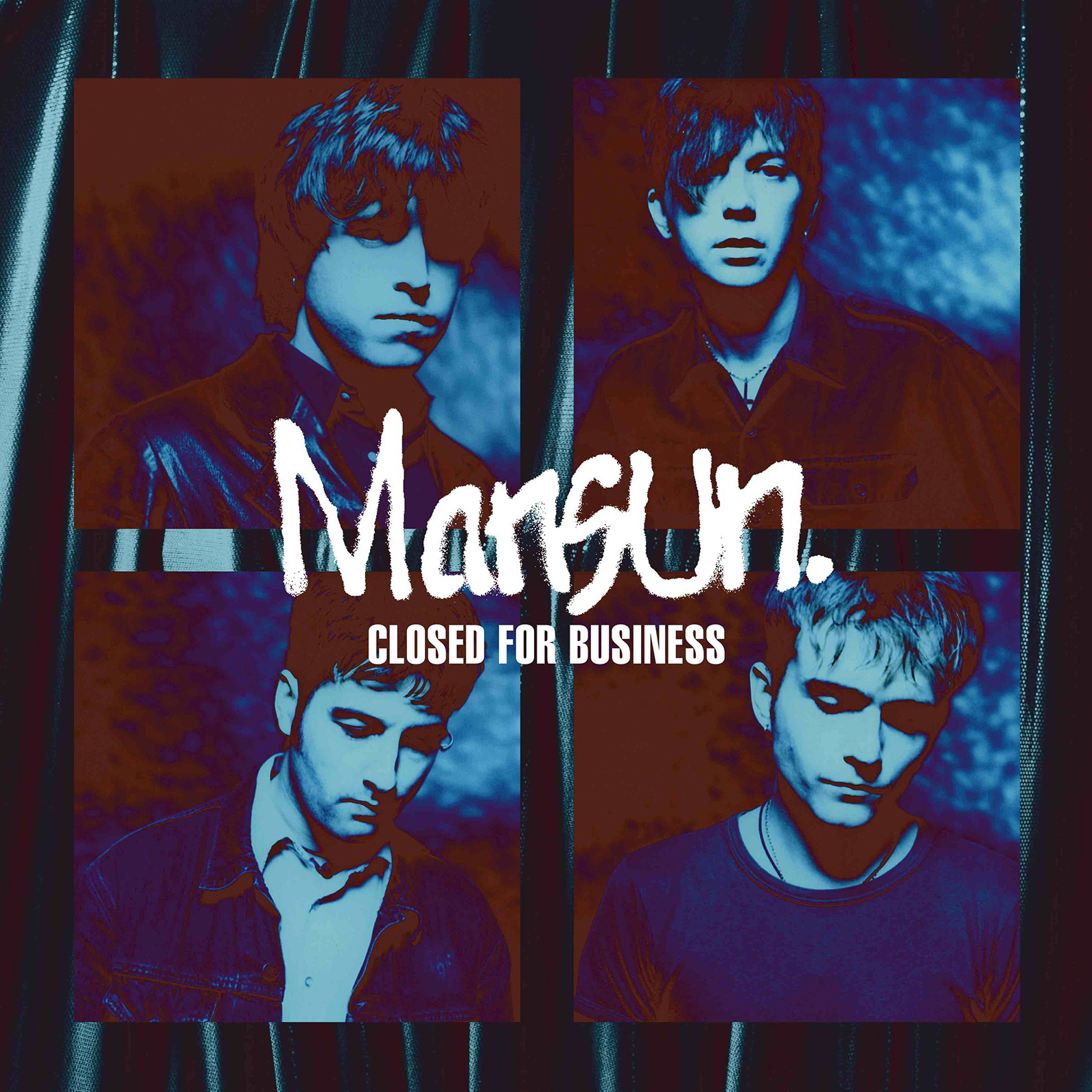
Mansun were without a doubt one of the most interesting and unusual groups to grow from the Britpop era of the mid-’90s. While the industry and the music press were desperate to comfortably pigeonhole every guitar band alongside the likes of Oasis and Blur, this four-piece from Chester were collaborating with Doctor Who’s Tom Baker, sampling ‘Dance Of The Sugarplum Fairy’ and writing songs about cross-dressing clergymen. Over 15 years after the band’s demise comes this extensive 25 disc boxset profiling their output in full.
Their 1997 debut Attack Of The Grey Lantern was one that certainly stood out in the musical climate of the time: a bizarre twist on British guitar pop consisting of a diverse mixture of sounds put to freak anthem choruses, absurd lyrics about small-town weirdos and a style that was refreshingly out of step with the rest of the British guitar scene. There was Paul Draper with his emotive vocals, and a twisted, instinctive talent for maverick pop songwriting, Dominic Chad with his intergalactic guitar solos, and the resonant rhythms of the band’s “engine room” Andie Rathbone, one of the greatest and most underrated drummers to have ever picked up a pair of sticks. Then there was bassist Stove King, who just had a funny name.
It’s often tempting to say that Mansun were ahead of their time, but they weren’t. They weren’t even symbolic of their era, more like something that was being beamed in from a parallel universe. They were if you like, of their very own space and time. As well as the eternal indie classics ‘Wide Open Space’, ‘Taxloss’ and ‘Egg Shaped Fred’, there’s the stunning opener ‘The Chad Who Loved Me’, which soars majestically before exploding into the heavy, sensational Bond-esque epic that its title suggests. A lot of people forget that Attack Of The Grey Lantern was a number one album, and a record so remarkably ambitious that it’s often hard to believe you’re listening to a debut LP.
Hot on the heels came the standalone single ‘Closed For Business’, released as an EP across two CD formats that again featured some remarkable B-sides. This was a band who didn’t just churn out any old garbage to fill the spaces on a CD single, but a group who valued the importance of never letting the quality slip. They would approach non-album tracks like they were simultaneously recording a separate album that ran parallel to the main one, a contrast to lazy groups trotting out poor remixes and below-par fillers. Their prolific approach to recording is the reason that despite only releasing three proper studio albums, over a decade and a half later, Mansun fans can enjoy a boxset made up of over 20 CDs. Five of these CDs chronicle all of the b sides from the EPs, many of them songs which were just as strong as the singles and album tracks.
In 1998 the band released their second LP. Six left critics and casual listeners baffled, to say the least. It’s marvellous lead single ‘Legacy’ was anthemic certainly but in retrospect a haunting and poignant insight into the mind of an evidently troubled Draper, who was now writing from a brutally personal angle. The ferocious title track and the storming double punch of ‘Negative’ and ‘Shotgun’ are just a few of the raw, abrasive and shape-shifting oddities that the band fire out during the course of this startling record. It definitely wasn’t packed with potential singles. With lyrical passages referencing failure, self-destruction, Taoism, Winnie The Pooh, ‘The Prisoner’ and the death of Brian Jones, there wasn’t a jovial singalong anywhere in sight.
It was a handful of song parts divided up by lots of segueing movements rather than an album full of potential hits. I can only begin to imagine what the people at their label thought of it. It was and still is hard to believe that a commercially successful band had followed up a number one debut album with this sprawling jigsaw of insane ideas and uncompromising, multi-directional song fragments. It’s a post-punk prog masterpiece that didn’t make any sense in the indie rock scene of 1998 because it wasn’t meant to. Railing against the musical complacency of the surrounding mainstream climate, one of the reasons Six’s appeal hasn’t worn off is because it doesn’t sound dated. You can’t put a date on the genuinely one-off sound and style of Six. Although it has influenced a number of people, nothing quite like it has been made since. It isn’t relevant to 1998, and neither is it relevant to any other year before or after it. It is a remarkable, incomparable and timeless musical oddity, and quite rightly a cult classic.
When the band returned in 2000 with the excellent Top 10 single ‘I Can Only Disappoint U’, there were high hopes for the third album. But in the end, Little Kix sounded like the result of being told by Parlophone “you’ve had your fun, now it’s time to deliver some hits”. With a lot of the edges smoothed away, the music was undeniably restrained, especially in comparison to what had come before. Tidier and more focused certainly, but missing the sort of quirks and left turns which made the first two albums and the EPs so extraordinary. Their label Parlophone even brought in producer Hugh Padgham, well-known for working with the likes of Sting and Phil Collins and often credited with creating the 80s MOR sound.
Even the best songs are blunted somewhat by the production, with the beautiful Suede-like ‘Electric Man’ arranged in a style more reminiscent of the Lighthouse Family than any of Mansun’s true influences. Despite classics like ‘Love Is’ and ‘Comes As No Surprise’, I’m not sure if anyone who’s heard all the albums would choose the beautiful but flawed Little Kix as their favourite. It’s more likely that many fans would have preferred some of the splendid b sides from that period: the majestic Bowie-esque ‘Decisions Decisions’, Chad’s ‘Golden Stone’ and the infectious ‘My Idea Of Fun’.
With 90s bands seen as yesterday’s news by the time the early 2000s British music press focused on The Strokes and the disappointing “new rock revolution”, it seemed like most had forgotten Mansun even existed. With the failure of Little Kix proving that the band knew best, record company interference would be relaxed and the band would set about recording their fourth album. However, tensions between the four members would come to an explosive climax during these sessions. In 2003 it was announced that Mansun was no more. The band would leave behind a half-finished final album, released as Kleptomania. With some tracks noticeably more complete than others, the songwriting often falls short of previous standards and leaves you wondering what might have been. One definite exception is the terrific opener ‘Getting Your Way’, where they are clearly enjoying being able to crank up the guitars again. The general vibe falls somewhere between the band’s early pre Attack Of The Grey Lantern work and the downbeat introspection of Little Kix and probably isn’t the best place for a new listener to start. But with B sides of the quality contained on the five CDs of EP tracks, there is little to complain about if you buy this box.
As well as nicely remastered versions of the four studio albums and B-sides collected together for the first time, the other CDs in this mammoth set include radio sessions, demos, rarities and outtakes, plus no less than 10 discs featuring various gigs. As well as being the subject of one of these CDs, the fantastic live show from Brixton Academy is presented as part of a DVD also containing all BBC performances and the insightful ‘Nobody Cares When You’re Gone’ documentary.
In addition to the wealth of music here, we also get The box a 160-page hardback book by Peter Doggett featuring newly discovered photos from fans and photographers around the world, a 112-page book documenting three different fanzines, a 48-page book of further archive material, 5 art prints, 4 postcards and a ‘Closed For Business’ lyric sheet signed by Paul Draper.
The devoted fan cannot go wrong with this fine collection.





Be the first to comment